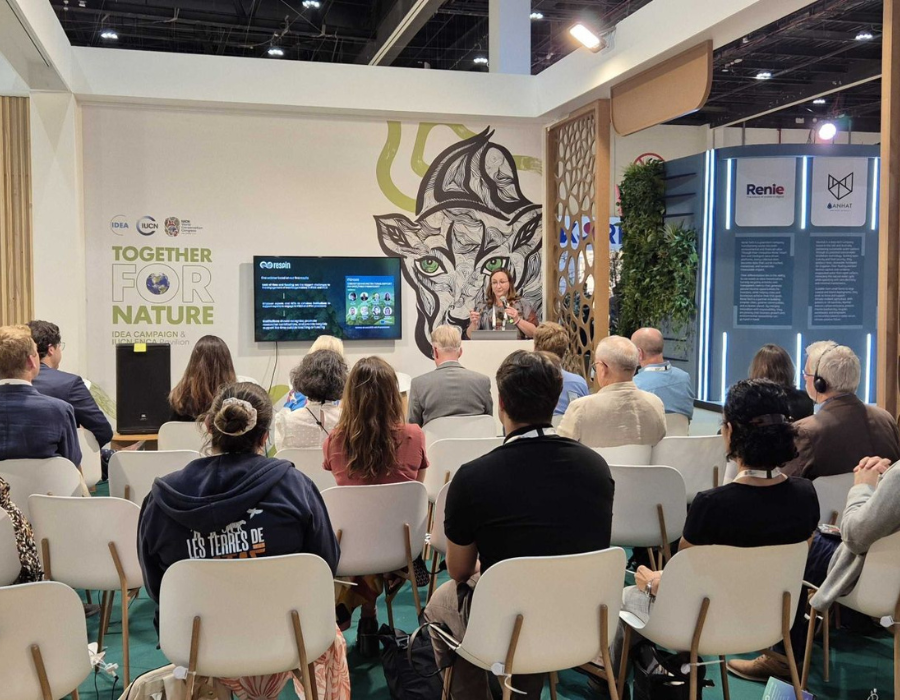The International Union for Conservation of Nature (IUCN) held its most recent World Conservation Congress in Abu Dhabi between 9 and 15 October 2025. Assembling more than 10,000 attendees from around the globe, this event centred around the approval of a 20-year Strategic Vision for the protection of the biosphere, a document reflecting the urgency of pressing environmental challenges and the growing transborder ambitions to address them.
BioAgora was actively involved in this important forum alongside its sister initiatives CO-OP4CBD and RESPIN. Together, they co-organised the session "Bridging science and policy: European action for biodiversity and climate goals" on 11 October at the IUCN Europe, North and Central Asia (ENCA) Pavilion. The two central goals at the core of this side event were awareness-raising and the facilitation of dialogue. With regard to the former, the agenda placed ongoing European efforts in support of biodiversity science-policy interfaces (SPIs) (such as the triad of organising projects) front and centre. As for the latter, researchers, decision-makers and stakeholders were invited to deliberate on the advancement of the Kunming-Montreal Global Biodiversity Framework (KM GBF) and the Paris Agreement.
The institutional organisers behind the session were the Norwegian Institute for Nature Research (NINA) and the Foundation for Biodiversity Research (FRB). They benefited from the collaboration of the IUCN Climate Crisis Commission, the Alexander von Humboldt Biological Resources Research Institute, the Finnish Environment Institute (Syke) and Institut de Recherche pour le Développement (IRD).
The side event itself was opened by CO-OP4CBD coordinator Nathalie Morata (FRB) and BioAgora consortium member Maja Vasilijević (NINA). They set the scene with a showcase of the three partnering initiatives behind the session, laying out their respective contributions to SPIs in Europe. Further background was provided by Giacomo Montereale Gavazzi from the Knowledge Centre for Biodiversity (KCBD) of the European Commission with an introduction of the UN CBD European Subregional Technical and Scientific Cooperation Support Centre.
A panel discussion took up the remainder of the agenda, with the topic in focus being the convergence between scientific knowledge and policy processes with its inherent principles, challenges and opportunities for improvement. The following participants lent their expertise to the conversation:
-
Nirmala Séon-Massin (Muséum National d'Histoire Naturelle)
-
Cathy Yitong Li (IUCN Climate Crisis Commission / IUCN World Commission on Protected Areas Young Professionals Network)
-
Julie Hammer-Monart (Ministry of Ecology of France)
-
Elise Huffer, (University of the South Pacific / IUCN Commission on Environmental, Economic and Social Policy)
-
Mariano Castro Jimenez (UN CBD Secretariat)
-
Oliver Avramoski (IUCN Eastern Europe and Central Asia Regional Office)
-
Gary Tabor (Centre for Large Landscape Conservation / IUCN World Commission on Protected Areas’ Connectivity Conservation Specialist Group)
-
Olivier Chassot (IUCN Asia Regional Office)
Insights from diverse sources and at various scales emerged within this segment, highlighting the importance of institutionalising the involvement of both researchers and indigenous communities in biodiversity governance. A critical factor on the road to that goal is far-reaching communication that zeroes in on the themes of accessibility and co-creation, making sure scientific inputs and wider public engagement are understood as indispensable to effective and lasting nature conservation at the political level. In that sense, it was stressed that sustaining a meaningful relationship between decision-makers and stakeholders relies on consistent and targeted outreach to policy, research and civic actors alike. The importance of captivating storytelling and consolidated repositories of capacity-building resources were singled out as crucial in this regard - the CO-OP4CBD Training Corner was cited as a notable recent example of the latter. All that being said, the panel concluded that true impact at the biodiversity SPI is only attainable when all these efforts are underpinned by a genuine impetus on the side of government officials and the organs they represent - without a clear intent for action from them, transformative change cannot coalesce.
Last but not least, CO-OP4CBD consortium member Pensoft Publishers afforded further visibility to the project and the side event via the dissemination of promotional materials at their dedicated booth on the exhibition floor.
